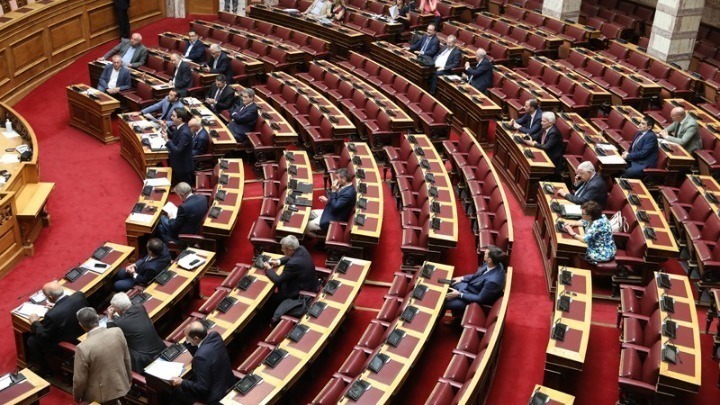Ministry of Culture bill reorganizing cultural institutions passes first reading in Parliament

A Ministry of Culture bill updating the operations and responsibilities of cultural institutions affiliated with it, including museums and sites, was approved by the ruling party in its first reading on Thursday at the Standing Committee on Cultural and Educational Affairs.
The opposition parties said they would withhold judgment until the plenary debate, while the Communist Party of Greece said it would vote it down.
Committee members heard from directors of the institutions their opinions on the bill.
New Democracy rapporteur Michalis Livanos said that all of the agencies invited for an opinion had been very positive about the bill, despite specific observations. Commenting on parties that objected to the very strict control of legal entities of the Ministry of Culture, Livanos said the presidents and vice-presidents of the ministry-supervised institutions would be selected through the state examination agency ASEP for reasons of meritocracy. He added that "most of the bill's regulations, if not all of them, are a product of talks the Ministry of Culture had with relevant agencies and local communities, in order to reach specific solutions on issues that have arisen."
The institutions included in the bill are the following:
- National Gallery/Alexandros Soutsos Museum, allowed to receive private, public, national, international, or European Union funding or donations; Director Syrago Tsiara welcomed the provisions, saying that museums are no longer limited to being art depositories and conservation facilities but must be allowed to fully take advantage of their dynamics.
- MOMus reorganization, comprising five museums of Thessaloniki including the Museums of Modern Art and Contemporary Art; representative Epaminondas Christofilopoulos said that MOMus wants to support innovation and substantial dialog in modern trends, and is the second most-visited organization in Thessaloniki. The bill resolves technical issues, he said, while noting that 30% of funding comes from private donors.
- School of Tinos for marble sculptors, founded in 1955, is upgraded from a preparatory school and professional school to a three-year higher-education school, and is reorganized. It will also be allowed to sign contracts and assume the implementation of works that are co-funded by the European Union or other funding agencies. Tinos Mayor Panagiotis Krontiras requested a change in name and receive funds from the state as well.
- Souli and Zalongo historical site of the Greek War of Independence; introduces a special cultural tax of 0.75 euros received by the Zagori Municipality for every room or hotel room lying within city limits. The historical area includes several sites. The Governor of the Region of Ipiros Alexandros Kachrimanis supported the bill and said the city fee will be used to cover needs of the area like conservation of wall paintings.
- Thessaloniki Film Festival; its adds the prizes of "Golden Alexander" and "Silver Alexander" to winning Greek or international documentaries, which will be the new and exclusive focus of the festival. It will be enamed "International Documentary Festival". President Akis Sakellariou said the addition of "international" was necessary for a festival that has been screening documentaries for 27 years.
- Hellenic Film and Audiovisual Center (EKKOMED), which was founded in September 2024, will both support domestic films and be reponsible for attracting large investments under the bill, CEO Leonidas Christopoulos said. The center has been setting up key operations since September, including a more automated process of funding.
- Audiovisual Producers' Association of Greece (SAPOE); legal counsel Alexandros Nikolouzos said that Greek producers should be allowed to name a foreign company as joint producer for cross-border productions, while its president commented on terms that discriminated between large and small producers.
Culture Minister Mendoni
Culture Minister Lina Mendoni spoke of the private funding the ministry had received in the last five years, and responded to criticism about board members' and officials' salaries at institutions overseen by the ministry as follows: "Culture without funding and without paying people who do the work cannot happen, it never did. Today Greek culture is more promoted abroad than ever before. It is the first time that a culture minister of Greece has been invited to the G7 Summit, in Napioli in 2024. This is the international recognition of where Greek culture is abroad."
(File photo)


